Unit8课文翻译
大学英语精读第一册第三版 unit8 课文英汉翻译
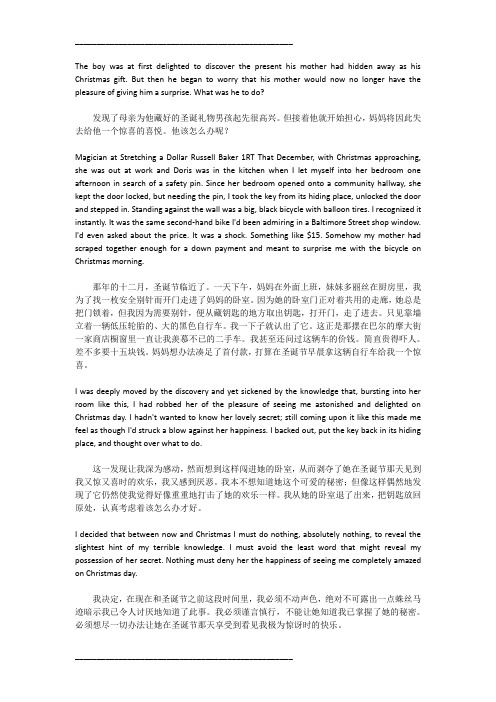
The boy was at first delighted to discover the present his mother had hidden away as his Christmas gift. But then he began to worry that his mother would now no longer have the pleasure of giving him a surprise. What was he to do?发现了母亲为他藏好的圣诞礼物男孩起先很高兴。
但接着他就开始担心,妈妈将因此失去给他一个惊喜的喜悦。
他该怎么办呢?Magician at Stretching a Dollar Russell Baker 1RT That December, with Christmas approaching, she was out at work and Doris was in the kitchen when I let myself into her bedroom one afternoon in search of a safety pin. Since her bedroom opened onto a community hallway, she kept the door locked, but needing the pin, I took the key from its hiding place, unlocked the door and stepped in. Standing against the wall was a big, black bicycle with balloon tires. I recognized it instantly. It was the same second-hand bike I'd been admiring in a Baltimore Street shop window. I'd even asked about the price. It was a shock. Something like $15. Somehow my mother had scraped together enough for a down payment and meant to surprise me with the bicycle on Christmas morning.那年的十二月,圣诞节临近了。
Unit-8-Nature-and-Nurture新编大学英语第二版第三册课文翻译
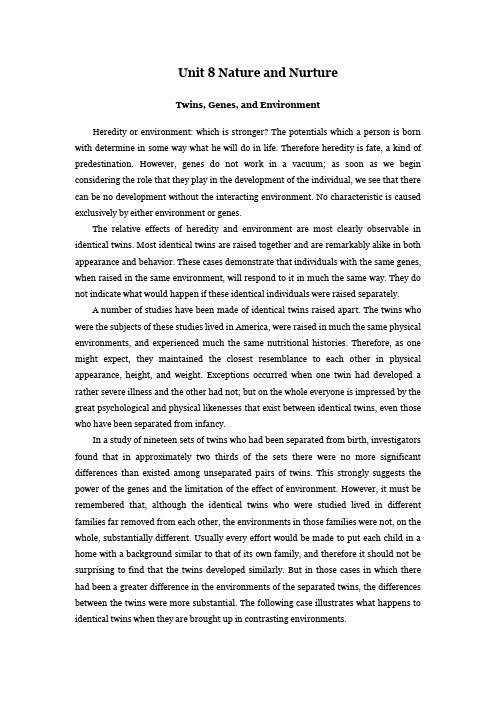
Unit 8 Nature and NurtureTwins, Genes, and EnvironmentHeredity or environment: which is stronger? The potentials which a person is born with determine in some way what he will do in life. Therefore heredity is fate, a kind of predestination. However, genes do not work in a vacuum; as soon as we begin considering the role that they play in the development of the individual, we see that there can be no development without the interacting environment. No characteristic is caused exclusively by either environment or genes.The relative effects of heredity and environment are most clearly observable in identical twins. Most identical twins are raised together and are remarkably alike in both appearance and behavior. These cases demonstrate that individuals with the same genes, when raised in the same environment, will respond to it in much the same way. They do not indicate what would happen if these identical individuals were raised separately.A number of studies have been made of identical twins raised apart. The twins who were the subjects of these studies lived in America, were raised in much the same physical environments, and experienced much the same nutritional histories. Therefore, as one might expect, they maintained the closest resemblance to each other in physical appearance, height, and weight. Exceptions occurred when one twin had developed a rather severe illness and the other had not; but on the whole everyone is impressed by the great psychological and physical likenesses that exist between identical twins, even those who have been separated from infancy.In a study of nineteen sets of twins who had been separated from birth, investigators found that in approximately two thirds of the sets there were no more significant differences than existed among unseparated pairs of twins. This strongly suggests the power of the genes and the limitation of the effect of environment. However, it must be remembered that, although the identical twins who were studied lived in different families far removed from each other, the environments in those families were not, on the whole, substantially different. Usually every effort would be made to put each child in a home with a background similar to that of its own family, and therefore it should not be surprising to find that the twins developed similarly. But in those cases in which there had been a greater difference in the environments of the separated twins, the differences between the twins were more substantial. The following case illustrates what happens to identical twins when they are brought up in contrasting environments.Gladys and Helen were born in a small Ohio town and were separated at about eighteen months of age. They did not meet again until they were twenty-eight years old. Helen had been adopted twice. Her first foster parents had proved to be unstable, and Helen had been returned to the orphanage after a couple of years; after several months she was again adopted, by a farmer and his wife who lived in southeastern Michigan. This was her home for the next twenty-five years. Her second foster-mother, though she had had few educational advantages herself, was determined that Helen should receive a good education; Helen eventually graduated from college, taught school for twelve years, married at twenty-six, and had a daughter.Gladys was adopted by a Canadian railroad conductor and his wife. When she was in the third grade, the family moved to a rather isolated part of the Canadian Rockies, where there were no schools, and Gladys' formal education came to an end, and was not resumed until the family moved to Ontario. She stayed at home and did housework until she was seventeen, and then went to work in a knitting mill. She went to Detroit at nineteen, got a job, and married when she was twenty-one.Helen had been healthier than Gladys, in childhood and adulthood, but other than that, their environments had been very similar except for their educations. Their weight, height, hair color, and teeth were very similar. The differences that distinguished them were obviously associated with the different social lives they had led.Helen was confident, graceful, made the most of her personal appearance, and showed considerable polish and ease in social relationships. Gladys was shy, self-conscious, quiet and without charming or graceful manners. A scientist who studied them remarked, "As an advertisement for a college education the contrast between these two twins should be quite effective."Considering the nature of their environmental experiences, the differences in Helen and Gladys are not surprising. Since psychological traits depend so much upon experience, it is to be expected that they will reflect it. On the other hand, traits that are not liable to be influenced by the environment are more likely to exhibit a high degree of similarity in identical twins. Important as they are, genes alone are never absolutely responsible for any trait. What we can do is set by the genes, but what we actually do is largely determined by the environment.基因、环境与双胞胎遗传与环境究竟哪一个影响更大呢?从某种程度上讲,一个人生来具有的潜力将决定他一生的作为。
Unit8 课文翻译
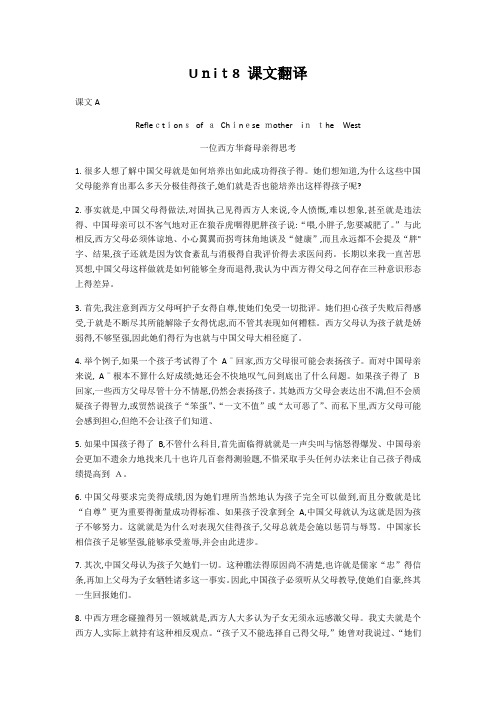
Unit8 课文翻译课文AReflectionsof aChinese mother inthe West一位西方华裔母亲得思考1.很多人想了解中国父母就是如何培养出如此成功得孩子得。
她们想知道,为什么这些中国父母能养育出那么多天分极佳得孩子,她们就是否也能培养出这样得孩子呢?2.事实就是,中国父母得做法,对固执己见得西方人来说,令人愤慨,难以想象,甚至就是违法得、中国母亲可以不客气地对正在狼吞虎咽得肥胖孩子说:“喂,小胖子,您要减肥了。
”与此相反,西方父母必须体谅地、小心翼翼而拐弯抹角地谈及“健康”,而且永远都不会提及“胖"字、结果,孩子还就是因为饮食紊乱与消极得自我评价得去求医问药。
长期以来我一直苦思冥想,中国父母这样做就是如何能够全身而退得,我认为中西方得父母之间存在三种意识形态上得差异。
3.首先,我注意到西方父母呵护子女得自尊,使她们免受一切批评。
她们担心孩子失败后得感受,于就是不断尽其所能解除子女得忧虑,而不管其表现如何糟糕。
西方父母认为孩子就是娇弱得,不够坚强,因此她们得行为也就与中国父母大相径庭了。
4.举个例子,如果一个孩子考试得了个Aˉ回家,西方父母很可能会表扬孩子。
而对中国母亲来说, Aˉ根本不算什么好成绩;她还会不快地叹气,问到底出了什么问题。
如果孩子得了B回家,一些西方父母尽管十分不情愿,仍然会表扬孩子。
其她西方父母会表达出不满,但不会质疑孩子得智力,或贸然说孩子“笨蛋”、“一文不值”或“太可恶了”、而私下里,西方父母可能会感到担心,但绝不会让孩子们知道、5.如果中国孩子得了B,不管什么科目,首先面临得就就是一声尖叫与恼怒得爆发、中国母亲会更加不遗余力地找来几十也许几百套得测验题,不惜采取手头任何办法来让自己孩子得成绩提高到A。
6.中国父母要求完美得成绩,因为她们理所当然地认为孩子完全可以做到,而且分数就是比“自尊”更为重要得衡量成功得标准、如果孩子没拿到全A,中国父母就认为这就是因为孩子不够努力。
人教新目标八年级上册英语Unit8课文翻译
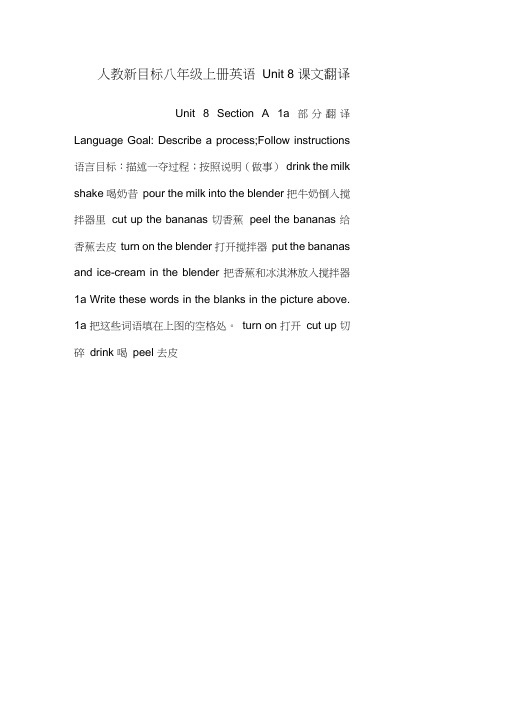
人教新目标八年级上册英语Unit 8 课文翻译Unit 8 Section A 1a 部分翻译Language Goal: Describe a process;Follow instructions 语言目标:描述一夺过程;按照说明(做事)drink the milk shake 喝奶昔pour the milk into the blender 把牛奶倒入搅拌器里cut up the bananas 切香蕉peel the bananas 给香蕉去皮turn on the blender 打开搅拌器put the bananas and ice-cream in the blender 把香蕉和冰淇淋放入搅拌器1a Write these words in the blanks in the picture above. 1a 把这些词语填在上图的空格处。
turn on 打开cut up 切碎drink 喝peel 去皮pour倒put 放Unit 8 Section A 1b 部分翻译Listen and put the instructions in order. 听录音,把操作说明排序。
Turn on the blender. 打开搅拌器。
Cut up the bananas. 切香蕉。
Drink the milk shake.喝奶昔。
Pour the milk into the blender. 把牛奶倒入搅拌器。
Put the bananas and ice-cream in the blender. 把香蕉和冰洪淋放入搅拌器。
Peel three bananas. 剥三根香蕉。
Unit 8 Section A 2c 部分课文翻译Ask and answer questions about how to make fruit salad. 关于怎样制作水果沙拉提问并回答。
A:Let's make fruit salad.A:让我们制作水果沙拉吧。
八年级下册新版unit8课文翻译

八年级下册新版u n i t8课文翻译 work Information Technology Company.2020YEARWhen I first arrived on this island, I had nothing.当我第一次到达这个岛屿的时候,我一无所有。
But I’ve found the ship and made a small boat.但是我发现了这艘大船,然后做了艘小船。
I’ve brought back many things I can use---food and drinks, tools, knives and guns.我已经带回来了许多我能够用到的东西---食物,饮料,工具,刀,和枪。
Although I have lost everything, I have not lost my life.尽管我已经失去了所有,但是我没有失去我的生命。
So I will not give up and I will wait for another ship.因此我将不会放弃,我会永远等待另外一艘船。
I have already cut down trees and built a house.我已经砍到了树,造了房子。
I go out with my gun almost every day to kill animals and birds for food.我每天出去几乎都带着我的枪去打动物和鸟来作为食物。
I’m even learning to grow fruit and vegetables.我甚至学习去种水果和蔬菜。
A few weeks ago, I found the marks of another man’s feet on the sand.一个星期以前,我发现了另外一个人在沙地上的足迹。
Who else is on the island 还有谁在这个岛屿上呢How long have they been here他们在这里有多久了Not long after that, I saw some cannibals trying to kill two men from a broken ship.在那不久之后,我看到两个食人肉者正在试图杀掉来自于一艘破船的两个人。
Unit 8 Two Truths to Live By课文翻译

1. 生活的艺术就是要懂得何时紧抓、何时放手,因为人生就是个矛盾:在令我们依恋于它所赋予的种种恩赐的同时,它也注定我们最终得放弃这些恩赐。
正如古代的犹太学者们所言:“人降世时拳头紧握,但离世时还得松手。
”2. 我们当然要紧抓生命,不仅因为它奇妙无比,而且因为它所蕴含的美已散布到了地球的每个角落。
其实,我们都懂得这个道理,然而我们往往只有在回首过去时才会明白这一点,只是在记起它往昔的美丽时,我们却突然发现已时过境迁了。
3. 我们铭记褪色的美、消逝的爱。
但是这种记忆却饱含着苦涩,我们痛惜没有在美丽绽放的时候注意它,没有在爱情到来的时候回应它。
4. 最近的一次经历再次使我明白了这个道理。
一次严重的心脏病发作之后,我在重症监护病房住了几天。
那不是个令人愉快的地方。
5. 一天上午,我得接受几项额外的检查。
由于所需的检查器械在医院另一头的一幢建筑里,所以我得躺在轮床上被推着穿过院落。
6. 在我们从病房出来的瞬间,阳光洒在我的身上,我所感觉到的就只有这阳光。
它是多么美丽,多么温暖,多么闪耀,多么辉煌啊!7. 我环视四周,看看是否还有其他人也在享受这金色的阳光,然而所有的人都是来去匆匆,且大多数人眼睛只顾盯着地面。
继而我便想到,我也常常陷于琐事,有时甚至陷入俗物之中,对身边每天的美景也是视而不见。
8. 我从这次经历所洞悉的灼见,其实与这次经历本身一样平淡无奇:生命的恩赐是珍贵的—只是我们对此从未留心罢了。
9. 因此,对我们有着自相矛盾的要求的人生一方面要求我们:不要过于忙碌而错失生活中的美好和庄严; 虔诚地迎接每个黎明的到来;拥抱每一个时辰,抓住珍贵的每一分钟。
10. 紧紧把握人生……但又不能抓得过死,松不开手。
这是人生这枚硬币的另一面,也正是其矛盾的另一面:我们必须接受失去的现实,学会如何放手。
11. 要学会这点并非易事。
尤其当我们年轻时,以为世界在我们的掌控之中,但凡激情满怀的我们一心想得到的东西,都将属于我们。
新视野大学英语第三版第一册UNIT8课文翻译
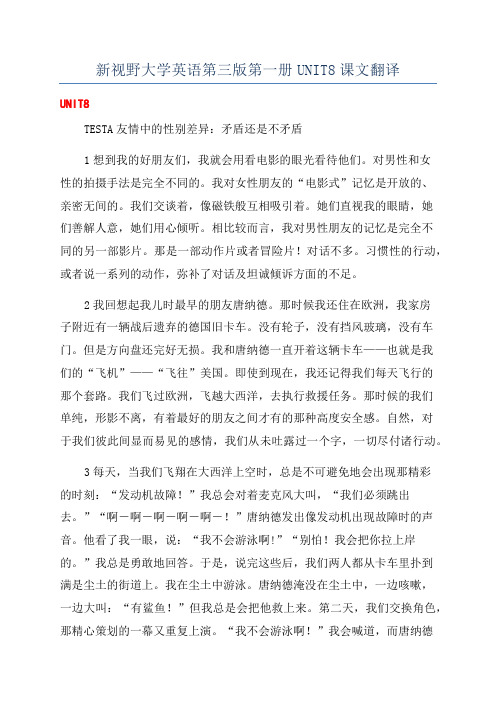
新视野大学英语第三版第一册UNIT8课文翻译UNIT8TESTA友情中的性别差异:矛盾还是不矛盾1想到我的好朋友们,我就会用看电影的眼光看待他们。
对男性和女性的拍摄手法是完全不同的。
我对女性朋友的“电影式”记忆是开放的、亲密无间的。
我们交谈着,像磁铁般互相吸引着。
她们直视我的眼睛,她们善解人意,她们用心倾听。
相比较而言,我对男性朋友的记忆是完全不同的另一部影片。
那是一部动作片或者冒险片!对话不多。
习惯性的行动,或者说一系列的动作,弥补了对话及坦诚倾诉方面的不足。
2我回想起我儿时最早的朋友唐纳德。
那时候我还住在欧洲,我家房子附近有一辆战后遗弃的德国旧卡车。
没有轮子,没有挡风玻璃,没有车门。
但是方向盘还完好无损。
我和唐纳德一直开着这辆卡车——也就是我们的“飞机”——“飞往”美国。
即使到现在,我还记得我们每天飞行的那个套路。
我们飞过欧洲,飞越大西洋,去执行救援任务。
那时候的我们单纯,形影不离,有着最好的朋友之间才有的那种高度安全感。
自然,对于我们彼此间显而易见的感情,我们从未吐露过一个字,一切尽付诸行动。
3每天,当我们飞翔在大西洋上空时,总是不可避免地会出现那精彩的时刻:“发动机故障!”我总会对着麦克风大叫,“我们必须跳出去。
”“啊-啊-啊-啊-啊-!”唐纳德发出像发动机出现故障时的声音。
他看了我一眼,说:“我不会游泳啊!”“别怕!我会把你拉上岸的。
”我总是勇敢地回答。
于是,说完这些后,我们两人都从卡车里扑到满是尘土的街道上。
我在尘土中游泳。
唐纳德淹没在尘土中,一边咳嗽,一边大叫:“有鲨鱼!”但我总是会把他救上来。
第二天,我们交换角色,那精心策划的一幕又重复上演。
“我不会游泳啊!”我会喊道,而唐纳德就会来救我。
我俩数百次地把对方从必死的境地中救出,直到最终有一天我家真的要去美国了。
我和唐纳德在火车站呆呆地站着,准备道别。
我们不知道该说些什么,这次我们谁也救不了谁。
于是,当火车驶离时,我俩只是默默地流泪。
资料《Unit8课文原文与翻译(素材)译林版八年级英语上册》

译林版八年级上册英语课文及翻译UNIT 8英中对照版Comic stripIt's raining. My house is all wet. Can I come in, Eddie?下雨了。
我的房子都湿了。
我能进来吗,艾迪?Sure, come in.好的,请进。
I was sleeping when it started to rain.开始下雨的时候我真在睡觉。
Didn't you hear the rain?你没有听见下雨吗?No. When I woke up, there was water everywhere!没有。
当我醒来的时候,到处都是水。
Come with me, Eddie.和我来吧,艾迪。
Why?为什么?Who will mop up the water if I go home without you?如果我不带你回家,谁去用拖把把水擦干啊?ReadingThe Taiwan earthquake台湾地震It was about two o'clock in the early morning.那大约发生在凌晨两点。
I was sleeping when the earthquake started.当地震开始的时候我正在睡觉。
At first, I felt a slight shake.起初,我感到了一阵轻微的震动。
Then I heard a loud noise like thunder.然后我听到雷鸣一般的巨响。
Soon the real noise came, like bombs under the ground.很快,真正的响声来了,就像是地下发生了爆炸。
The earth started to shake.地面开始摇晃起来。
People screamed in fear.人们恐惧地尖叫。
Some ran out of the building.一些人从大楼中跑了出去。
- 1、下载文档前请自行甄别文档内容的完整性,平台不提供额外的编辑、内容补充、找答案等附加服务。
- 2、"仅部分预览"的文档,不可在线预览部分如存在完整性等问题,可反馈申请退款(可完整预览的文档不适用该条件!)。
- 3、如文档侵犯您的权益,请联系客服反馈,我们会尽快为您处理(人工客服工作时间:9:00-18:30)。
Unit8 课文翻译课文AReflections of a Chinese mother in the West一位西方华裔母亲的思考1. 很多人想了解中国父母是如何培养出如此成功的孩子的。
他们想知道,为什么这些中国父母能养育出那么多天分极佳的孩子,他们是否也能培养出这样的孩子呢?2. 事实是,中国父母的做法,对固执己见的西方人来说,令人愤慨,难以想象,甚至是违法的。
中国母亲可以不客气地对正在狼吞虎咽的肥胖孩子说:“喂,小胖子,你要减肥了。
”与此相反,西方父母必须体谅地、小心翼翼而拐弯抹角地谈及“健康” ,而且永远都不会提及“胖” 字。
结果,孩子还是因为饮食紊乱和消极的自我评价得去求医问药。
长期以来我一直苦思冥想,中国父母这样做是如何能够全身而退的,我认为中西方的父母之间存在三种意识形态上的差异。
3. 首先,我注意到西方父母呵护子女的自尊,使他们免受一切批评。
他们担心孩子失败后的感受,于是不断尽其所能解除子女的忧虑,而不管其表现如何糟糕。
西方父母认为孩子是娇弱的,不够坚强,因此他们的行为也就与中国父母大相径庭了。
4. 举个例子,如果一个孩子考试得了个A一回家,西方父母很可能会表扬孩子。
而对中国母亲来说,A一根本不算什么好成绩;她还会不快地叹气,问到底出了什么问题。
如果孩子得了B 回家,一些西方父母尽管十分不情愿,仍然会表扬孩子。
其他西方父母会表达出不满,但不会质疑孩子的智力,或贸然说孩子“笨蛋” 、“一文不值”或“太可恶了” 。
而私下里,西方父母可能会感到担心,但绝不会让孩子们知道。
5. 如果中国孩子得了B,不管什么科目,首先面临的就是一声尖叫和恼怒的爆发。
中国母亲会更加不遗余力地找来几十也许几百套的测验题,不惜采取手头任何办法来让自己孩子的成绩提高到A。
6. 中国父母要求完美的成绩,因为他们理所当然地认为孩子完全可以做到,而且分数是比“自尊”更为重要的衡量成功的标准。
如果孩子没拿到全A,中国父母就认为这是因为孩子不够努力。
这就是为什么对表现欠佳的孩子,父母总是会施以惩罚和辱骂。
中国家长相信孩子足够坚强,能够承受羞辱,并会由此进步。
7. 其次,中国父母认为孩子欠他们一切。
这种看法的原因尚不清楚,也许是儒家“忠”的信条,再加上父母为子女牺牲诸多这一事实。
因此,中国孩子必须听从父母教导,使他们自豪,终其一生回报他们。
8. 中西方理念碰撞的另一领域是,西方人大多认为子女无须永远感激父母。
我丈夫是个西方人,实际上就持有这种相反观点。
“孩子又不能选择自己的父母,”他曾对我说过。
“他们连要不要出生都没法选择, 是父母强行给了他们生命, 所以父母有责任抚养他们。
孩子一点都 不欠父母的,他们只对自己的子女负责任。
”这话让我觉得西方父母受到的待遇真差。
9. 第三, 中国父母相信他们知道什么最适合自己的孩子, 因此对子女的愿望和喜好有着至高 无上的权威。
中国孩子没有什么父母不能侵犯的权利, 所以中国女孩儿在高中不能交男朋友, 孩子们不能晚回家, 不能参加在外过夜的野营旅行。
哪怕一丁点的反抗或愤慨, 只要不是绝 对地服从, 都会被根除, 直至压服。
不要误会我——这并非中国父母不关心孩子, 事实恰恰 相反!中国父母放弃了他们一切的一切, 来帮助自己的子女。
这只是教育模式完全不同而已。
10. 西方的宣传往往把亚洲母亲描绘为工于心计、冷漠无情,还喜欢动武,而对孩子的真正 兴趣不管不顾。
对许多中国人来说, 他们私下里都认为自己比西方人更关心孩子, 而且愿意 为他们牺牲更多,而西方人似乎都乐见孩子变坏、 有辱家风。
我想双方都有误解。
当然也有 部分共同之处——普天下称职的父母都想为孩子做最好的安排,只是方式方法不同而已。
11. 西方人宣扬尊重孩子的个性,鼓励他们去追求真正的激情,支持他们的选择,并提供积 极有益的环境。
但西方孩子在自视甚高、 自尊极强的同时, 在现实世界又会表现如何?中国胸;他们知道该如何利用自己在这个世界上所能学到的最好的本事去竞争。
一试便知! 课文 BA Western mother's response位西方母亲的回应In the days since the newspaper published the column by the Chinese mother, I have thought of what I would say to her if I met her. I might point out, as others have, that Asian-American girls aged 15 to 24 have above average rates of suicide and eating disorders. I might question the arrogance of ascribing her child's success to the Chinese child-rearing techniques of criticism and name-calling when it could just as likely have resulted from genetic or economic blessings. But I have a feeling that she knows that.报纸上刊登出一位中国母亲的专栏之后的几天中, 我曾经想过, 要是能碰到她, 我会对 她说些什么。
我也许会像其他人一样指出, 15 岁至 24 岁的亚裔美国女孩自杀和饮食失调 的比例高于平均值。
我也许会质疑她把自己孩子的成功归结于中国式批评和谩骂的养育技巧, 这种想法实在傲慢, 孩子的成功可能只是源于良好的遗传基因或经济条件。
不过, 我觉得这点她是知道的。
More importantly, if I did make such contentions, I'd risk being called a liar by my ownchildren. Sophie, my oldest, would remind me of the recent evening when I stared in stony父母如此磨砺子女为将来计,让其了解自己的所能, 并赋予他们技能、 工作习惯和内在信心 这些没人能拿走的东西,这样来对孩子进行保护。
到表现时机来临时, 中国孩子已经成竹在布丁”好坏,silence at her report card, sniffing in contempt at her father's happy congratulations.更重要的是,如果我确实持此观点, 长女, 会提醒我就在不久前的一个晚上, 亲高兴的祝贺嗤之以鼻。
"What?" she said. "I got 5 solid As."I shrugged.我耸耸肩。
"Come on, my husband complained.别这样,”我丈夫抱怨道。
My daughter narrowed her eyes at me. She knew what was coming.女儿眯起眼睛看我,她知道接下来会发生什么。
I pointed at the remaining three grades, sociology, biochemistry and intermediate aesthetics, none a solid A. I certainly didn't think it warranted the "screaming, hair-tearing explosion" that the author informs us would have greeted the daughter of a Chinese mother. However, I articulated my displeasure clearly enough. The word "garbage" was not uttered. But, it was only because I feared my husband's reproach that I refrained from telling my own daughter, when she collapsed in tears, that she was acting like an idiot.我指着余下的三门课的成绩,社会学、生物化学和中级美学,没有一个是 A 。
我当然 不认为对此应该“尖叫和恼怒地爆发” ,就像作者说的中国妈妈对待女儿的那样。
不过,我 也足够清晰地表达了自己的不满,只是没说“垃圾”这个词。
她痛哭失声,我忍住了没说她 像个白痴,但那也只是因为我担心丈夫的责备而已。
The difference, I suppose, between proud Chinese mothers and Western ones is that I feltashamed that I didn't subordinate my anger to my pride in what she did accomplish. Admittedly (and I am ashamed to say this too), I also did not then go out and get hundreds of practice tests and work through them with my daughter far into the night, doing whatever it took to get her the A. I would leave those tasks for a tutor to administer.自负的中国母亲与西方母亲之间的差异, 我觉得, 在于我很羞愧自己并未对女儿取得的 成绩感到自豪,而是任由自己的怒气发泄。
诚然(对此我也很惭愧),我之后也并没有去找 数百套的测验题,然后与女儿一起做题到深夜,千方百计让她拿到A 。
我会把那些工作留给家教来做。
I am, actually, grateful to the author, and for the insights she gave me. Reading her essay就得冒着被自己孩子说成骗子的风险。
索菲, 我的 我盯着她的成绩单一言不发, 毫无表情, 并对她父怎么了?”她说。
